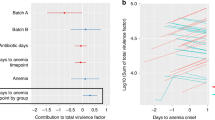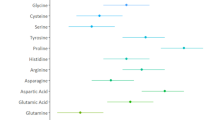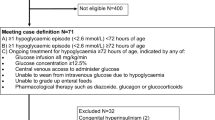Abstract
We previously showed that, in prematurely born infants, an anabolic state without metabolic acidosis can be achieved upon intravenous amino acid (AA) administration in the immediate postnatal phase, despite a low energy intake. We hypothesized that the anabolic state resulted from an increased protein synthesis and not a decreased proteolysis. Furthermore, we hypothesized that the energy needed for the higher protein synthesis rate would be derived from an increased glucose oxidation. To test our hypotheses, 32 ventilated premature infants (<1500 g) received intravenously either solely glucose or glucose and 2.4 g AA/kg/d immediately postnatally. On postnatal d 2, each group received primed continuous infusions of either [1-13C]leucine or [U-13C6]glucose. 13CO2 enrichments in expiratory air and plasma [1-13C]α-KICA (as an intracellular leucine precursor) and [U-13C6]glucose enrichments were measured by mass spectrometry techniques. The AA administration resulted in an increased incorporation of leucine into body protein and a higher leucine oxidation rate, whereas leucine release from proteolysis was not affected. Glucose oxidation rate did not increase upon AA administration. In conclusion, the anabolic state resulting from AA administration in the immediate postnatal period resulted from increased protein synthesis and not decreased proteolysis. The energy needed for the additional protein synthesis was not derived from an increased glucose oxidation.
Similar content being viewed by others
Log in or create a free account to read this content
Gain free access to this article, as well as selected content from this journal and more on nature.com
or
Abbreviations
- α-KICA:
-
α-keto-isocaproic-acid
- AA:
-
amino acid(s)
- GPR:
-
glucose production rate
- LRP:
-
leucine release from protein
- NOGD:
-
nonoxidative glucose disposal
- NOLD:
-
nonoxidative leucine disposal
- VLBW:
-
very low birth weight
References
te Braake FW, van den Akker CH, Wattimena DJ, Huijmans JG, van Goudoever JB 2005 Amino acid administration to premature infants directly after birth. J Pediatr 147: 457–461
Van Goudoever JB, Colen T, Wattimena JL, Huijmans JG, Carnielli VP, Sauer PJ 1995 Immediate commencement of amino acid supplementation in preterm infants: effect on serum amino acid concentrations and protein kinetics on the first day of life. J Pediatr 127: 458–465
Thureen PJ, Melara D, Fennessey PV, Hay WW Jr 2003 Effect of low versus high intravenous amino acid intake on very low birth weight infants in the early neonatal period. Pediatr Res 53: 24–32
Rivera A Jr, Bell EF, Bier DM 1993 Effect of intravenous amino acids on protein metabolism of preterm infants during the first three days of life. Pediatr Res 33: 106–111
Saini J, MacMahon P, Morgan JB, Kovar IZ 1989 Early parenteral feeding of amino acids. Arch Dis Child 64: 1362–1366
van Lingen RA, van Goudoever JB, Luijendijk IH, Wattimena JL, Sauer PJ 1992 Effects of early amino acid administration during total parenteral nutrition on protein metabolism in pre-term infants. Clin Sci (Lond) 82: 199–203
Usher R, McLean F 1969 Intrauterine growth of live-born Caucasian infants at sea level: standards obtained from measurements in 7 dimensions of infants born between 25 and 44 weeks of gestation. J Pediatr 74: 901–910
1993 The CRIB (clinical risk index for babies) score: a tool for assessing initial neonatal risk and comparing performance of neonatal intensive care units. The International Neonatal Network. Lancet 342: 193–198
Matthews DE, Schwarz HP, Yang RD, Motil KJ, Young VR, Bier DM 1982 Relationship of plasma leucine and alpha-ketoisocaproate during a L-[1-13C]leucine infusion in man: a method for measuring human intracellular leucine tracer enrichment. Metabolism 31: 1105–1112
Thompson GN, Pacy PJ, Ford GC, Merritt H, Halliday D 1988 Relationships between plasma isotope enrichments of leucine and alpha-ketoisocaproic acid during continuous infusion of labelled leucine. Eur J Clin Invest 18: 639–643
Leij-Halfwerk S, Dagnelie PC, van Den Berg JW, Wattimena JD, Hordijk-Luijk CH, Wilson JP 2000 Weight loss and elevated gluconeogenesis from alanine in lung cancer patients. Am J Clin Nutr 71: 583–589
van Goudoever JB, Sulkers EJ, Chapman TE, Carnielli VP, Efstatopoulos T, Degenhart HJ, Sauer PJ 1993 Glucose kinetics and glucoregulatory hormone levels in ventilated preterm infants on the first day of life. Pediatr Res 33: 583–589
Poindexter BB, Karn CA, Leitch CA, Liechty EA, Denne SC 2001 Amino acids do not suppress proteolysis in premature neonates. Am J Physiol Endocrinol Metab 281: E472–E478
Liechty EA, Boyle DW, Moorehead H, Auble L, Denne SC 1999 Aromatic amino acids are utilized and protein synthesis is stimulated during amino acid infusion in the ovine fetus. J Nutr 129: 1161–1166
Clark SE, Karn CA, Ahlrichs JA, Wang J, Leitch CA, Leichty EA, Denne SC 1997 Acute changes in leucine and phenylalanine kinetics produced by parenteral nutrition in premature infants. Pediatr Res 41: 568–574
Melville S, McNurlan MA, McHardy KC, Broom J, Milne E, Calder AG, Garlick PJ 1989 The role of degradation in the acute control of protein balance in adult man: failure of feeding to stimulate protein synthesis as assessed by L-[1-13C]leucine infusion. Metabolism 38: 248–255
Giordano M, Castellino P, DeFronzo RA 1996 Differential responsiveness of protein synthesis and degradation to amino acid availability in humans. Diabetes 45: 393–399
Denne SC, Karn CA, Ahlrichs JA, Dorotheo AR, Wang J, Liechty EA 1996 Proteolysis and phenylalanine hydroxylation in response to parenteral nutrition in extremely premature and normal newborns. J Clin Invest 97: 746–754
Poindexter BB, Karn CA, Ahlrichs JA, Wang J, Leitch CA, Liechty EA, Denne SC 1997 Amino acids suppress proteolysis independent of insulin throughout the neonatal period. Am J Physiol 272: E592–E599
Kopple JD 1987 Uses and limitations of the balance technique. JPEN J Parenter Enteral Nutr 11: 79S–85S
Tappy L, Acheson K, Normand S, Schneeberger D, Thelin A, Pachiaudi C, Riou JP, Jequier E 1992 Effects of infused amino acids on glucose production and utilization in healthy human subjects. Am J Physiol 262: E826–E833
Author information
Authors and Affiliations
Corresponding author
Rights and permissions
About this article
Cite this article
van den Akker, C., te Braake, F., Wattimena, D. et al. Effects of Early Amino Acid Administration on Leucine and Glucose Kinetics in Premature Infants. Pediatr Res 59, 732–735 (2006). https://doi.org/10.1203/01.pdr.0000214990.86879.26
Received:
Accepted:
Issue date:
DOI: https://doi.org/10.1203/01.pdr.0000214990.86879.26
This article is cited by
-
Targeting optimal protein delivery in parenteral and enteral nutrition for preterm infants: a review of randomized, controlled trials
Journal of Perinatology (2023)
-
Aggressive parenteral nutrition in sick very low birth weight babies: A randomized controlled trial
Indian Pediatrics (2013)
-
Does a reduced glucose intake prevent hyperglycemia in children early after cardiac surgery? a randomized controlled crossover study
Critical Care (2012)



